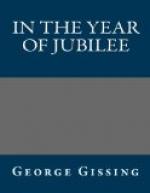‘Have I misled you?’ said Tarrant, watching her face with frank pleasure.
‘No, indeed you haven’t. This is very beautiful!’
’I discovered it last year, and spent hours here alone. I couldn’t ask you to come and see it then,’ he added, laughing.
‘It is delightful!’
’Here’s your seat,—who knows how many years it has waited for you?’
She sat down upon the old trunk. About the roots of the elm above grew masses of fern, and beneath it a rough bit of the bank was clothed with pennywort, the green discs and yellowing fruity spires making an exquisite patch of colour. In the shadow of bushes near at hand hartstongue abounded, with fronds hanging to the length of an arm.
‘Now,’ said Tarrant, gaily, ’you shall have some blackberries. And he went to gather them, returning in a few minutes with a large leaf full. He saw that Nancy, meanwhile, had taken up the book from where he dropped it to the ground; it lay open on her lap.
‘Helmholtz! Away with him!’
‘No; I have opened at something interesting.’
She spoke as though possession of the book were of vital importance to her. Nevertheless, the fruit was accepted, and she drew off her gloves to eat it. Tarrant seated himself on the ground, near her, and gradually fell into a half-recumbent attitude.
‘Won’t you have any?’ Nancy asked, without looking at him.
‘One or two, if you will give me them.’
She chose a fine blackberry, and held it out. Tarrant let it fall into his palm, and murmured, ‘You have a beautiful hand.’ When, a moment after, he glanced at her, she seemed to be reading Helmholtz.
The calm of the golden afternoon could not have been more profound. Birds twittered softly in the wood, and if a leaf rustled, it was only at the touch of wings. Earth breathed its many perfumes upon the slumberous air.
‘You know,’ said Tarrant, after a long pause, and speaking as though he feared to break the hush, ‘that Keats once stayed at Teignmouth.’
Nancy did not know it, but said ‘Yes.’ The name of Keats was familiar to her, but of his life she knew hardly anything, of his poetry very little. Her education had been chiefly concerned with names.
‘Will you read me a paragraph of Helmholtz?’ continued the other, looking at her with a smile. ‘Any paragraph, the one before you.’
She hesitated, but read at length, in an unsteady voice, something about the Conservation of Force. It ended in a nervous laugh.
‘Now I’ll read something to you,’ said Tarrant. And he began to repeat, slowly, musically, lines of verse which his companion had never heard:
’O what can ail thee, Knight-at-arms,
Alone and palely loitering?
The sedge has wither’d from the lake,
And no birds sing.’
He went through the poem; Nancy the while did not stir. It was as though he murmured melody for his own pleasure, rather than recited to a listener; but no word was inaudible. Nancy knew that his eyes rested upon her; she wished to smile, yet could not. And when he ceased, the silence held her motionless.




